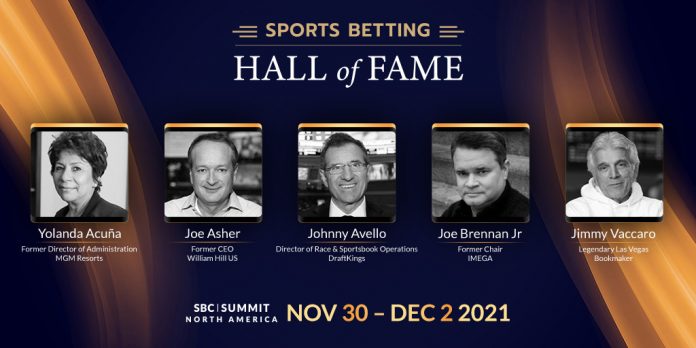Joe Brennan Jr, who becomes inducted to the Sports Betting Hall of Fame at next week’s SBC Summit North America, walks us through his journey from digital marketing to sports betting before explaining why we’re entering a new era of gambling legislation.
SBC: First of all, can you tell us a little bit about your background – how did you first become involved in the betting and gaming industry?
In a word, accidentally. I grew up in Philadelphia so I was around sports betting since I was a child. Funnily enough, the first time I ever bet on sports was when I was in the second grade, I bet a quarter – which was my milk money at the time – on the weekly NFL parlay tickets that got passed around there.
My career started with digital media, I wound up at AOL in the early 2000s. I was on a team which was looking at the best ways to take AOL’s existing business assets and try to find new opportunities and revenue streams. At that point, online gaming was in its infancy stages.
When I left the company in 2005, there was already a growing awareness of “digital civil liberties” amongst people who worked in the online industry. The consensus was that for anything that you could legally do in the real world, you should also be able to do so in the online world.
Something which piqued our interest was when the state of Michigan considered passing a law to require criminal background checks for people when they went on online dating sites.
In response to that, we decided we had to organise. We formed a business association called iMEGA, Interactive Media Entertainment And Gaming Association. We decided to look at legislation like the online dating background checks.
The good thing was that this proposed legislation in Michigan never really went anywhere, but we saw it as an indicator that there were potential legal threats to all sorts of segments of society that had begun operating on the web
SBC: What would you say are the standout moments of your career?
The obvious choice would be to say March 2018, when the US Supreme Court overturned PASPA. That was a big moment. But actually, I would go back to December 2008. That was when we had our first group call with a few folks who were interested in possibly challenging the federal law against sports betting.
I remember it well, because I was sitting in my car outside my doctor’s office, in the pouring rain. We talked about how, if we weren’t successful, we wouldn’t make anything worse. But if we were successful, then that would change everything. We began by reaching out to Ray Lesniak, the New Jersey state senator, and to build some organisation in the state.
It was at that point that we were truly “at the beginning,” so to see how things are today is great. The other stand-out moment was when we won the statewide vote 10 years ago. That might have been even bigger than the day that the Supreme Court overturned PASPA. Up to that point, Governor Christie wasn’t on board with this effort. He had declined to join the original lawsuit that we filed back in March 2009, in which we partnered with his predecessor, Governor Jon Corzine. But finally, two weeks out from the sports betting vote, Governor Christie decided to endorse it.
For me, it felt like handing your child off and hoping the person looking after them would do the right thing.
SBC: You played a major role in legalizing sports betting and online gaming in New Jersey. When did you start to feel the tide was turning?
In the early years, it was really tough because most people thought we were wasting our time. Even some of the Las Vegas bookmakers thought that the law wouldn’t be overturned. For so long, people thought we were crazy – and at times, we really questioned why we were bothering.
It wasn’t really until the Supreme Court agreed to hear the case. The polarity then seemed to change overnight. When the Supreme Court agreed to hear the lawsuit, the bandwagon for legalising sports betting was suddenly full. It seemed like we were getting knocked off of our own bandwagon.
Then there was a sense that once it got to the Supreme Court, opponents became allies. The casino associations and companies that were originally opposing us were now agreeing that sports betting should be legalised.
SBC: Did you anticipate the US market becoming as big a powerhouse as it is now?
The National Gambling Impact Study outlined just how big the potential market was in America. At the time (1997), they were saying sports betting was approaching $300bn a year in handle in the United States, and it was almost completely unregulated – with the exception of Nevada.
In New Jersey, we brought in a local public policy group that had done a lot of economic impact studies for various projects across the state. We asked them to take a look at what they thought the sports betting market would be like.
What was amazing was how they got the numbers right on the nose. They believed that it would be a pretty sizeable market and that within a year or two, it would be much larger than the Nevada market, which really was an eye opener for many people. We distributed that study freely, making it available to the state legislature and allies. It was so successful and credible – we began to have people quoting our study results back to us.
SBC: As we head into 2022, what are your key predictions for the market?
I think we’ve had sports betting “wave 1.0”. The low hanging fruit of states that were likely to pass legislation have done so. Some perhaps too quickly, as in the case of Arizona, which was less than four months between the law passing and everyone going live on 9 September. That kind of speed has created some rocky patches, though thankfully nothing that hasn’t gotten sorted out.
In the second wave of sports betting, politics is likely going to make the market even more fragmented. You’re going to have people trying very hard to use their compacts or their competitive position to try and maintain competitive advantages and limit those new markets to competition and participation. I don’t think that’s necessarily a good thing. There’s got to be a middle way to do this – to protect people, protect existing gaming interest and existing game compacts, while at the same time opening these markets up in a sensible way.
SBC: And finally, what would be your biggest piece of advice for those looking to start out in the industry?
Right now, I think the market is under-performing because of the offerings coming from the UK and in Europe because they’ve not been localised enough. There’s been too much effort at shoehorning the US public into ways of doing business that don’t fit with our experience. Let’s face it, mobile and online sports betting has existed in the United States for quite a while – it’s just that it was being run from Antigua.
One of the reasons why you may still see a significant percentage of bettors out there who are continuing to bet with grey market brands is because they don’t see what they want in the current offering. There’s an American style of betting that’s existed for quite a long time, and generally that is what Americans want.
Also when you look at the offerings between the brands we have right now, it all feels the same. The industry needs to find a way to nurture new entrants and to develop something new and exciting for their consumer.
We really need some sort of environment where newbies can get educated, can learn to fail and then create a product that can meet the regulatory standards and then find a legitimately new audience. We need an environment where new market entrants aren’t being crushed by the regulatory and compliance costs before they even get to show themselves. Hopefully things will loosen up.
I am surprised at how quickly things have expanded. I don’t think that we’ll be at 48 to 50 states within the next five years, but back in 2018 I certainly wouldn’t have expected that this would have gone the way it has.
Joe Brennan Jr will be inducted into the Sports Betting Hall of Fame in a special ceremony at the MetLife Stadium on December 1, 2021, during the SBC Summit North America conference and trade show. A full version of this interview will feature in the forthcoming issue of SBC Leaders Magazine later this week.














